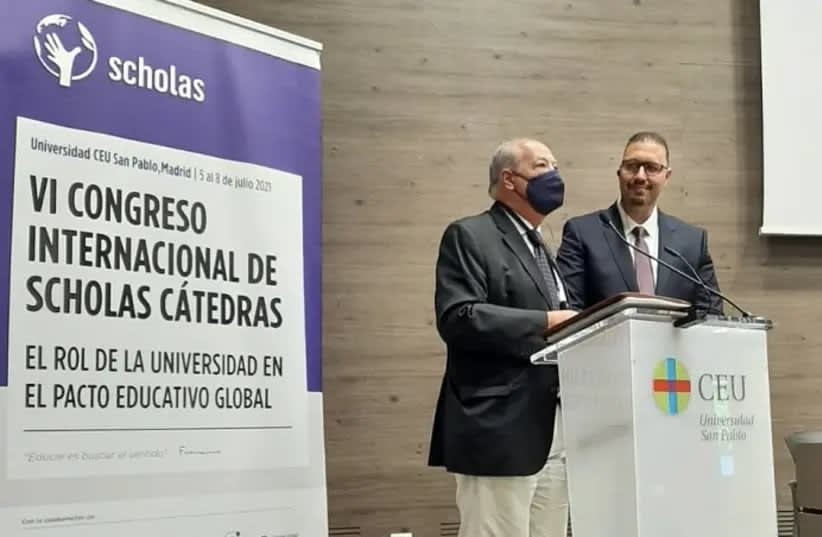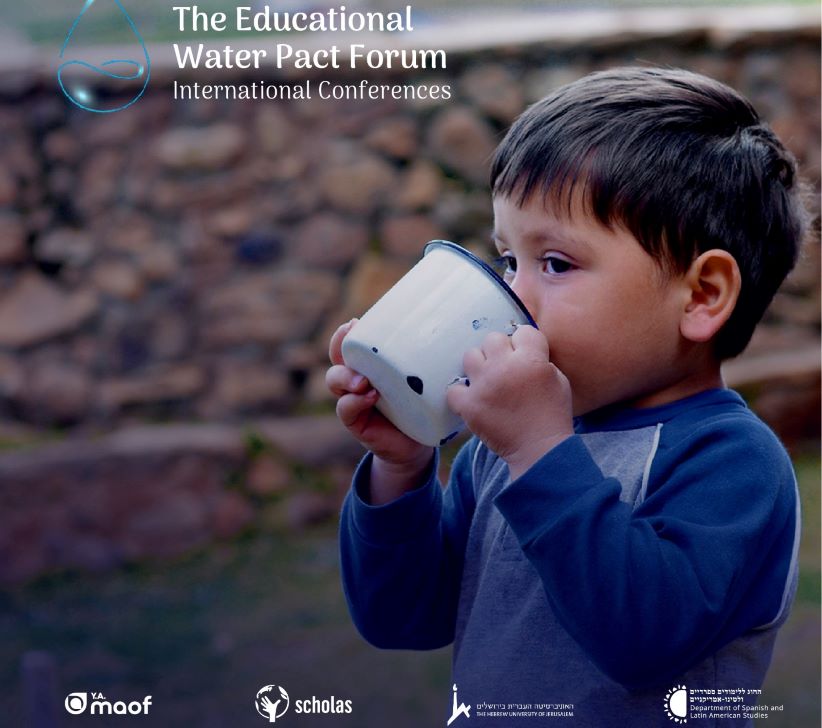The event, with over 250 participants from 24 countries and 28 public and private water companies, was hosted by Israeli project management company Y.A. Maof together with the Vatican's Scholas Occurrentes and the Hebrew University of Jerusalem. The conference brought together researchers, spiritual leaders, governmental water supply officials and water technology companies.
A conference with an ambitious objective convened last month: the Educational Water Pact Forum’s international conference sought to promote the pact’s goal of providing a glass of clean drinking water to every child in the world. The Water Pact was born from the common vision of the Pontifical Foundation Scholas Occurrentes and Israeli innovation and project management company Y.A. Maof. The two signed the pact in Madrid, last July and created the forum in order to heed the call of the world's most vulnerable, inspired by the ethical challenge of his holiness Pope Francis.
Michelle Bolsonaro, First Lady of Brazil |
The unique event brought together senior representatives and researchers from the Israeli and international water industry, and government water supply officials from Latin America and the Caribbean, thanks to the extraordinary reach and commitment of Scholas Occurrentes. Among them were the heads of the municipal water company of Monterey, Mexico and Guatemala City, the head of Peru’s and Honduras’ national water companies and rectors from 20 Latin American universities. Two South American first ladies, Michelle Bolsonaro of Brazil and Fabiola Yáñez of Argentina also participated virtually in the event and expressed their support for its goal.
Dozens of speakers took part in 10 different roundtables and discussions and shared their input on the conference’s theme: “Rethinking Academic, Public, and Private Cooperation in the field of Water Challenges”.
The conference’s first day sought to rethink the academic cooperation between the public and private sectors in Latin America with regards to water infrastructure. It opened with greetings from Professor Ruth Fine, director of the Department of Spanish and Latin American Studies at the Hebrew University, which also co-sponsored and played a central role in organizing the conference. Professor Fine was followed by Professor Enrique Palmeyro, Global Director of Scholas Occurrentes, and Mr. Giora Shaham, director of Israel’s Water and Sewage Authority.
The first session was about entrepreneurship and social responsibility in environmental protection, with Mr. Jonathan Haran, former director of Engineers Without Borders in Israel and a renewable energy expert at Y.A Maof, and Dr. Daniel Stigliano, Global Head of Scholas’ Chairs Program.
Then, in a session about water and social development Aqwise presented its solutions for wastewater treatment from the container level to large facilities, and upgrades it offers in existing facilities to produce better water quality and increase capacity. Prof. Ram Shpiner, VP of Science and technology at Y.A. Maof and founder of the Water Industry Engineering Department at Kinneret College in Israel detailed Maof’s plan for the establishment of “water excellence centers” in Central America in collaboration with Tech de Monterey and in South America in collaboration with the Catholic University of Chile. He noted that the need to train technicians, and workers in the water field is critical for the success of building an advanced water industry.
Fabiola Yáñez, First Lady of Argentina |
The second day delved into the nature of the Water Pact in a session with Professor Jose Maria del Corral, president of Scholas Occurrentes, Ygdal Ach, President & CEO of Y.A. Maof, ambassador Carlos Chavez Taffur, head of the Organization of Latin American Embassies in Israel, Gideon Behar, Special Envoy for Climate Change and Sustainability at the Israeli Ministry of Foreign Affairs, and professor Nissim Otmazgin, dean of the Faculty of Humanities at the Hebrew University of Jerusalem.
Later, in a roundtable about long term international cooperation in the field of water challenges, Yoram Morad, Special Envoy for International Water Affairs at the Israel Ministry of Foreign Affairs spoke about the ministry’s efforts to transfer water technologies and knowledge for Israeli to developing countries. Mr. Tebaldo Vinciguerra, of the Dicastery for Promoting Integral Human Development at the Holy See spoke of the Vatican’s work to bring potable water to developing countries both in the short immediate run and developing water solutions in the long run.
Dov Avital, VP of Strategy and Innovation at water tech company, the Metzer Group, spoke of his company’s focus on environmental sustainability in its water solutions together with maximizing the farmer's output. The session was moderated by Avraham Israeli, VP of water & agrotech at Y.A. Maof and former president of the Israel Water Association who discussed the need to prevent over fertilization with Nitrogen and mentioned Israel’s world record in recycling wastewater rate, 90%.
The subsequent panel dealt with future challenges in public - academic - private cooperation in the water field with the participation of Crista María Foncea Ferraté, president of the Water Company of Guatemala, Professor Roberto Parra Saldivar of the Tec of Monterrey and Meytal Shen Zur from Israeli water tech company Palgey Maim. Ms. Parra Salvidar described the current state of water resources in Guatemala City, and the main problems her company faces, such as lack of digital information, lack of collaboration between legal entities, and absence of a legal framework to govern these aspects since there is no water law in Guatemala.
The discussion was hosted by Maof’s Michelle Mejia, an environmental engineer with extensive experience in water reuse and sustainability projects and an international consultant with experience in water resources policy, wastewater treatment and environmental project management in Latin America.
The day closed with comments by Archbishop Angelo Vincenzo Zani, Secretary of the Congregation for Catholic Education at the Holy See and Professor Franklyn Hache, rector of APEC University at the Dominican Republic.
The conference’s third day dealt with innovation and social impact in water projects in Latin America, with the connection between Pope Francis’ encyclical “Laudato Si” and with the challenges of the public, private and academic partnership. The event’s final Roundtable was about rethinking water challenges in Latin America and included Lucy Silvia Henderson Palacios, VP of the Direct Council of SUNASS in Peru, Dr. Ornit Avidar, water systems & social impact expert at Y. A. Maof, prof. Edwin Castellanos, Director of the Center of Sustainable Economy at the University of the Valley of Guatemala and Keidar Grossman from Israeli water tech company Amiad.
The Educational Water Pact seeks to integrate innovative technological solutions in water management and create a local professional workforce in the water industry in Latin America and the Caribbean by building bridges between people and technology. It aims to achieve its goal through socio-environmental projects related to water treatment, and safe, sustainable access to water in underdeveloped regions. The pact was first announced at the annual Scholas conference in Madrid last July, which was attended by researchers from 118 universities, as well as diplomats, religious leaders and global governments' representatives, and was officially signed last December.
Scholas Occurrentes is a Pontifical organization active in 190 countries, present in five continents and was founded by Pope Francis to build the “Culture of Encounter.” In the educational field, its network connects more than 450,000 schools and a hundred universities in 35 countries with students from different socioeconomic backgrounds, diverse cultures and religions. It creates synergies and promotes knowledge sharing for the benefit of local communities. In the environmental aspect, Scholas is committed to promoting "integral ecology," meaning a change of habits and a more sustainable lifestyle that will allow humanity to take better care of Earth, our common home, as advocated by the Pope in his encyclical “Laudato Si.”
Y.A. Maof is an entrepreneurial project management company that provides advanced solutions that turn environmental challenges into resources. It is committed to creating long-term, sustainable economic and environmental benefits guided by the circular economy principles, and its solutions are based on sustainable business models in the fields of water infrastructure and purification, renewable energy, waste and wastewater management.
At the core of its activities, Y.A. Maof creates connections between people and technology, to allow regional decision-makers to pivot and lead their economy, environment, and society. The company accomplishes this by leading powerful global partnerships and facilitating meetings between academic experts, and social and spiritual leaders to promote together scalable, applicable, and innovative solutions.
Two more events are scheduled this year to promote the Water Pact’s goals. The first event will take place in the Vatican and is scheduled for later this summer. It will be the first official meeting of the Pact’s Board of Governors and an opportunity for water industry companies to present their solutions, activities and progress since the launch of the forum, as well as the Educational Water Pact Forum’s standard, which will be officially launched and awarded to eligible companies.
On September 5th-7th the 7th International Scholas Chairs Congress in collaboration with The Educational Water Pact Forum, will convene at the Católica Silva Henriquez University in Santiago de Chile to discuss education as the main instrument for social change. The event will bring together professors and researchers from the universities that are members of the Scholas Chairs Program together with prominent religious, cultural, business, and diplomatic figures, as well as representatives from NGOs, trade unions and governments.
In order to find out more about the conference and view recordings of the event, the following links can be used: Day 1, Day 2, and Day 3.
If you want to discover more about the water pact initiative, you are invited to enter the Water Pact website.
This article was written in cooperation with Y.A. Maof

